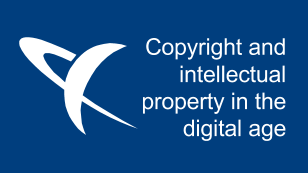 Copyright has only been around for about 300 years starting with England's Statute of Anne (1709). However it wasn't until the invention of the Printing Press which allowed for authors to reproduce their works cheaply and in copious amounts before it really flourished. How does this relate to copyright in modern times?
Copyright has only been around for about 300 years starting with England's Statute of Anne (1709). However it wasn't until the invention of the Printing Press which allowed for authors to reproduce their works cheaply and in copious amounts before it really flourished. How does this relate to copyright in modern times?
First we need to address the idea of ownership. Is that really what copyright is for? Do we really own something we create? All of the ideas that we used to create have come from previous people and if we're writing a book we might even directly quote them. Even with software many of the components have actually been developed by other people. When Microsoft released Windows 3.11 which was an Internet capable version of their OS they used Open Source software to make it Internet Capable. Should this reduce their ownership? When a band samples a riff from another band and use it in their song, should they have exclusive copyright to the song?
Next lets look at reproduction. Before the Printing Press copyright wasn't such an issue because most stories were presented orally. However when those stories or information could be commercially distributed and controlled copyright became the means to protect profit. In the Internet age we can reproduce a file such as a song millions of times and it never loses quality. If a song can be reproduced infinitum then what is a song worth?
Does copyright protect the artist or does it hinder our freedoms? In reality copyright laws are a means to push us into consumption, whereas the new culture coming out of the Internet is more collaborative and sharing. This can be seen in the Open Source software movement whose technology powers most of the Internet and copyright free websites that openly share media and encourage users to share and transform that media.
What happens when the song doesn't even exist in normal time and space any more? If my copy of the song is stored on a server in Russia that streams to my computer does local copyright law apply?
New business models are starting to appear that may address copyright and compensation issues. In News media a new Freemium model exists that allows users limited access to content but if they use it regularly they are asked to pay a subscription. Online music outlets such as Grooveshark allow users to play the music online for free but if they want it for their car or iPod they have to pay a small fee. Both of these models contradict copyright law yet they are flourishing and will likely become the basis of new copyright laws that will develop in the next few years.
 About
About
Brynn Like this post? Share with your friends: 


 Copyright has only been around for about 300 years starting with England's Statute of Anne (1709). However it wasn't until the invention of the Printing Press which allowed for authors to reproduce their works cheaply and in copious amounts before it really flourished. How does this relate to copyright in modern times?
Copyright has only been around for about 300 years starting with England's Statute of Anne (1709). However it wasn't until the invention of the Printing Press which allowed for authors to reproduce their works cheaply and in copious amounts before it really flourished. How does this relate to copyright in modern times? About
About

